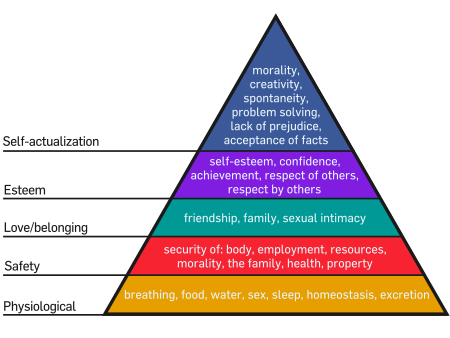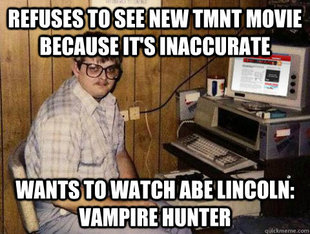First, let's take a look at the word "fanboy". In my research I originated the word to have popped up sometime around the mid-70's when two fans of Mavel Comics created their own magazine dedicated to their comic book obsession. Conjuring a pseudonym of the word "funboy" (the early metamorphosis of the term "metrosexual") they dubbed their magazine Fanboy, the name of the fictional character featured in the magazine. Fanboy combines the words fan, short for fanatic, and boy, the description applied to an adolescent male. That seems to be a pretty fair generalization of those it applies to. Fanboys tend to be overly passionate about their favorite forms of entertainment; almost to the point of evangelicalism.
Now, why is this? Why do some fans become frothingly angered, and defensive when their passion is questioned, or offered a different point of opinion. Well, to find out we only need to turn to Maslow's hierarchy of needs.
For those that didn't click the link (lazy bastards), a psychologist by the name of Abraham Maslow proposed the hierarchy of human needs around 1943. Designed much like the food guide pyramid, the hierarchy of human needs outlines the fundamental, psychological needs of all humans. At the bottom are the basic essentials; breathing, food, water, etc. However, the further up the pyramid goes the more complicated the needs become. The drive of passion that a "fanboy" emits can be found within the esteem column of the pyramid. Having faith in a product, or service can boost the self esteem; confidence in the medium shows confidence of self; "fanboys" do tend to respect those in their own circles; likewise, "fanboys" are respected by others of said circles. However, they do not seem to have many of the qualities of the top of the pyramid. To discuss this flaw we will need to slightly change topic.
Cognitive dissonance is a term used to describe the discomfort felt when one holds two or more conflicting ideas, values, opinions, etc. Symptoms of cognitive dissonance are frustration, anger, anxiety, embarrassment, etc. The theory of cognitive dissonance proposes that people have a motivational drive to reduce dissonance by altering existing cognitions, adding new ones to create a consistent belief system, or alternatively by reducing the importance of any one of the dissonant elements. People want their expectations to meet reality, creating a sense of equilibrium. Does this sound familiar with today's topic?
Cognitive dissonance is a term used to describe the discomfort felt when one holds two or more conflicting ideas, values, opinions, etc. Symptoms of cognitive dissonance are frustration, anger, anxiety, embarrassment, etc. The theory of cognitive dissonance proposes that people have a motivational drive to reduce dissonance by altering existing cognitions, adding new ones to create a consistent belief system, or alternatively by reducing the importance of any one of the dissonant elements. People want their expectations to meet reality, creating a sense of equilibrium. Does this sound familiar with today's topic?
Personally, I don't care if you are, or are not a "fanboy". Do whatever makes you happy. It's not my place to stop you. However, the purpose of this blog was for me to try interpreting the subject, and give my own personal opinion on the matter. And what is my opinion?
In my opinion, "fanboyism" is sort of self detrimental. Don't get me wrong, passion can be a good thing. It gives us that drive to do what we love, and allows us to attempt a level of prestige at them. However, passion is like a drug; it should be consumed in moderation. Passion left unchecked can cause us to just stay in the comfortable norm, and to never attempt anything outside of our own perception of what is necessary. It has the ability to close minds, and raise voices against what, in most cases, is a subjective topic anyway. That is my opinion on the subject, and why I do not associate with being a "fanboy". I have been playing video games since around the mid-90's. I got my first console, an NES, when I was 5. You could say that I'm passionate about gaming. But that's where my passion ends. I don't belittle anyone who doesn't play video games (though I do get pretty vocal about people who try to blame video games for tragedies covered in the media).
As I said before, however, do what makes you happy. If raising your banner for your favorite console (not to leave PC gamers out of the conversation), video game, comic book, movie, etc makes you feel better then do it. It's not my place to say you're any less of a person for doing so. I say live, and let live. It's just not my bag, man.



No comments:
Post a Comment